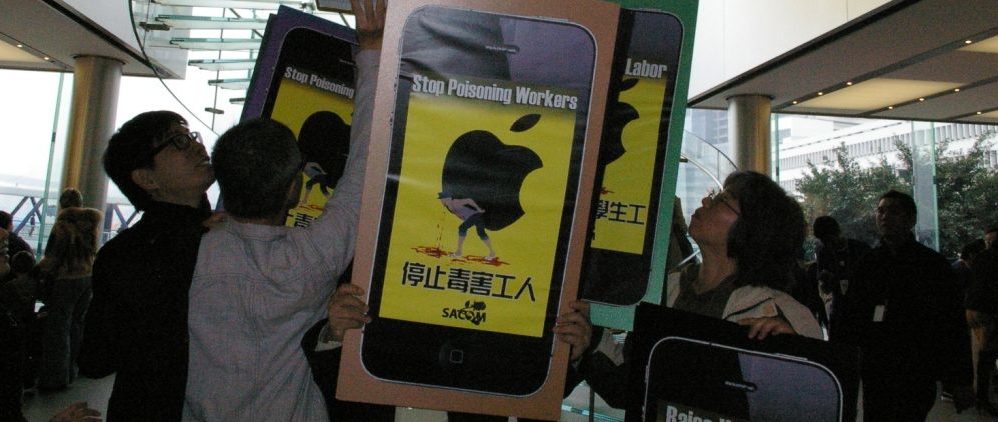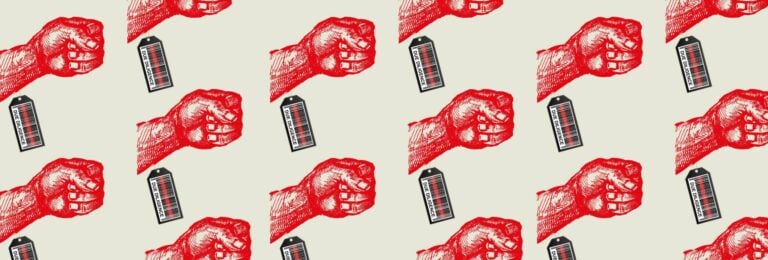
With Apple the FLA is not convincing as a multi-stakeholder initiative
In February 2012, Apple was the first electronics company to join the Fair Labor Association (FLA), a multi-stakeholder initiative (MSI) created in the clothing sector. After eighteen months, FLA has not convinced civil society organisations that are striving for better working conditions in the electronics production of its credibility.
“FLA operates more as an industry organisation than as a multi-stakeholder initiative,” says Lynda Yanz of the Canadian Maquila Solidarity Network (MSN), which until recently held a seat on the FLA board. Better things are expected from another MSI, the electronics programme created by the Sustainable Trade Initiative (IDH).
Failed to keep promises
At the request of Apple, in the spring of 2012, FLA started audits at three Chinese plants (with a total of 178,000 employees) of one of its major suppliers, Foxconn. Apple and Foxconn produced an action plan with 360 points for improvement(opens in new window) for implementation by 1 July 2013.
On 1 July, GoodElectronics (GE) published a press statement(opens in new window) concluding that Apple and Foxconn had not been able to keep those promises. GE is an international network of organisations dedicated to improving working conditions and sustainable production in the electronics industry. According to GE, Foxconn has not implemented improvements fast enough and failed to keep promises on wages, working hours and free trade union elections.
“FLA has not put enough pressure on Apple and Foxconn to take unambiguous measures against clear violations of the FLA code and Chinese law”, says Linda Yanz of the labour and women’s rights organisation MSN(opens in new window) , one of more than seventy members of the GE-network.
Between late 2009 and early 2013, MSN was a member of the FLA board. Yanz: “Despite scepticism, in 2009 we put FLA to the proof by joining it. We chose a combination of influencing within FLA and campaigning outside FLA. Success turned out to be possible: late 2009, in Honduras, FLA and Russell Athletic reached an agreement on employment and benefits for 1,200 employees who were previously dismissed. Moreover, the agreement provided trade union training and freedom of association in all Honduran factories of owner Fruit of the Loom.”
No structural changes
MSN was the only labour organisation within FLA that called for improvements in the code of conduct and complaints procedures and the inclusion of more trade union and labour organisation representatives on the board. Yanz: “When it turned out that FLA did not wish to implement structural changes on the latter two points, MSN stepped out. We felt like a voice crying in the wilderness.”
The fact that Apple joined FLA early in 2012 caused a sensation. FLA had no experience with electronics companies. The sector has two CSR initiatives: the Electronic Industry Citizenship Coalition (ECCI) and the Global e-Sustainability Initiative (GeSI), to which only companies are affiliated. Their CSR demands are less stringent than those of the more ‘experienced’ clothing sector. Neither ECCI or GeSI conduct audits. As a ‘FLA member’, Apple had the most progressive code of conduct.
Also Yanz was surprised that FLA teamed up with Apple. “This was not discussed by the board and with the NGO representation. FLA hardly consulted NGOs who have a rich knowledge of working conditions in the electronics industry.”
The glass is half empty, rather than half full
Yanz is stung by the fact that FLA now publicly praises small improvements. Pauline Overeem, coordinator of GE on behalf of SOMO, believes FLA should be more modest. “Right now they have not achieved enough. Supporters may say that it is a lengthy process and that the glass is half full. However, from the perspective of the Good Electronics Network, the glass is half empty. In addition, FLA has still not succeeded in convincing international and Chinese civil society organisations of its credibility. MSN has stepped down from the FLA board, Industriall Global Union has declined membership and local organisations in China keep their distance.”
Critical support for IDH
This spring, Apple also joined another multi-stakeholder initiative active in the electronics chain since 2012. The electronics programme of the Sustainable Trade Initiative (IDH)(opens in new window) aims to improve working conditions in electronics factories in China and improve their environmental performance. It aims to reach half a million workers. Philips, Dell and HP have participated from the very beginning. Nokia also recently joined the initiative. In total, these brands have included 25 suppliers in China.
Pauline Overeem: “SOMO, GoodElectronics and the Dutch trade union confederation FNV were involved from the outset. First as co-designers of the programme, now as advisers. Moreover, two labour organisations in China sit on a local steering committee, together with suppliers. Chinese not-for-profit labour organisations provide training for managers and employees of the participating factories. The intention is to create serious employee representation structures in all those factories.”
According to Pauline Overeem, SOMO’s main job and that of other involved organisations is to keep IDH focused. “IDH and the big brands must always focus on the interests of workers on the shop floor. They must also take into account the critical positions and sometimes limited capacity of the Chinese civil society organisations involved in the initiative. Sometimes they find that difficult.”
Read more:
- Will Apple turn over a new leaf when it joins the Fair Labor Association?, GoodElectronics, January 17, 2012(opens in new window)
- GoodElectronics, makeITfair, IMF declare FLA investigation at Apple supplier Foxconn to be a PR stunt, Joint statement by GoodElectronics, makeITfair and International Metalworkers’ Federation, February 23, 2012(opens in new window)
- Keeping an eye on Apple, GoodElectronics public statement re. Apple’s 2013 Supplier Responsibility report, February 7, 2013(opens in new window)
- Apple give workers a voice in Their future, Joint Statement by IMF, ITUC, SumOfUs, makeITfair, GoodElectronics, and SACOM, March 23, 2012(opens in new window)
Partners
Related news
-
 The hidden human costs linked to global supply chains in ChinaPosted in category:News
The hidden human costs linked to global supply chains in ChinaPosted in category:News Joshua RosenzweigPublished on:
Joshua RosenzweigPublished on: -
 Major brands sourcing from China lack public policies on responsible exitPosted in category:News
Major brands sourcing from China lack public policies on responsible exitPosted in category:News Joshua RosenzweigPublished on:
Joshua RosenzweigPublished on: -


